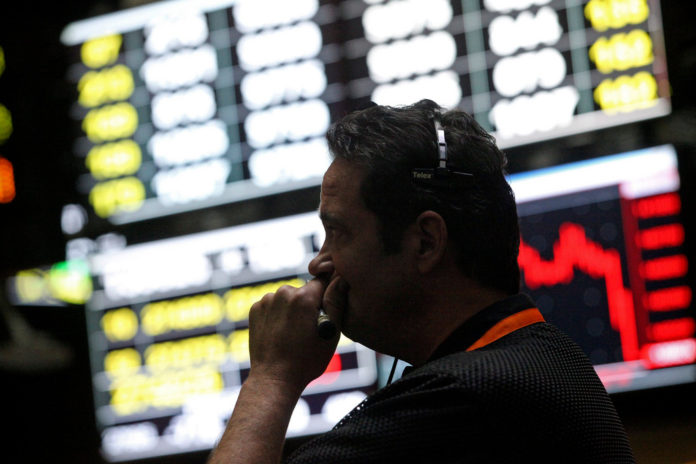
NEW YORK – U.S. stock-index futures declined as growth slowed in China’s services industry and American lawmakers signaled federal spending cuts will continue for weeks before they can reach a budget resolution.
Las Vegas Sands Corp. dropped 1.4 percent after saying it probably violated the U.S. Foreign Corrupt Practices Act. Celgene Corp. lost 1.5 percent after it presented test results for its experimental psoriasis medicine. Transocean Ltd. climbed 3.2 after reinstating its dividend payment. Hess Corp. rallied 3.7 percent after saying it will exit energy trading, marketing and retail businesses to focus on exploration and production.
Standard & Poor’s 500 Index futures expiring this month slipped 0.1 percent to 1,514.8 at 8:40 a.m. in New York, paring an earlier decline of as much as 0.6 percent. Contracts on the Dow Jones Industrial Average slid 22 points, or 0.2 percent, to 14,052. The S&P 500 rebounded last week from its only weekly loss so far this year, while the Dow rose to within 0.5 percent of its October 2007 all-time high.
“The macro economic picture has improved a little, but there is no reason to get excited,” Ivo Weinoehrl, who helps manage about $364 billion as U.S. equity portfolio manager at DWS Investments, said in a phone interview from Frankfurt. “The sequestration will cut roughly half a percentage point of growth this year. So the implication for the equity market is that it’s fully valued. Markets have rallied a lot.”
China’s services industries expanded last month at the slowest pace since September. The non-manufacturing Purchasing Managers’ Index fell to 54.5 in February from 56.2 in January, the Beijing-based National Bureau of Statistics and China Federation of Logistics and Purchasing said. A reading above 50 indicates expansion.
Spending cuts
Automatic cuts in U.S. federal spending, half of which are in defense programs, went into effect March 1 following a congressional impasse. The government will reduce spending by $1.2 trillion over the next nine years, including $85 billion in this fiscal year. The budget cuts will cause a 0.6 percentage- point reduction in economic growth this year, the Congressional Budget Office has estimated.
Even as President Barack Obama phoned Democratic and Republican legislators over the weekend, Obama’s aides and congressional leaders signaled the budget reductions would continue for weeks, possibly months.
Both sides indicated that revisiting the reductions would begin after they resolve a confrontation over legislation that’s needed to keep federal agencies running beyond March 27, placing a premium on avoiding a government shutdown.
“The debt ceiling talks, which are still a few months away, will be a much bigger issue and don’t yet seem to be on anyone’s radar,” Weinoehrl said.
Stock futures pared losses as Federal Reserve Vice Chairman Janet Yellen said the U.S. central bank should press on with $85 billion in monthly bond buying while tracking possible costs and risks from the unprecedented program.
“Turning to the potential costs of the Federal Reserve’s asset purchases, there are some that definitely need to be monitored over time,” Yellen said today in a speech in Washington. “At this stage, I do not see any that would cause me to advocate a curtailment of our purchase program.”
Warren Buffett, who built Berkshire Hathaway Inc. into a $250 billion company with funds from insurance units, said in his annual letter to shareholders on March 1 that low interest rates create “dim prospects” for the industry that fueled his firm’s growth.
Missed opportunity
The billionaire also said other CEOs who held back investment last year because of doubts about the economy missed an opportunity. The future of the U.S. has been uncertain since the country’s Declaration of Independence in 1776, he wrote.
“American business will do fine over time. And stocks will do well just as certainly,” Buffett said. “Since the basic game is so favorable, Charlie and I believe it’s a terrible mistake to try to dance in and out of it based upon the turn of tarot cards, the predictions of ‘experts,’ or the ebb and flow of business activity. The risks of being out of the game are huge compared to the risks of being in it,” he said of Vice Chairman Charles Munger.
Las Vegas Sands, embroiled in two U.S. investigations and a court battle with the former head of its Chinese casino business, lost 71 cents to $50.60. The casino company probably violated the FCPA, which prohibits improper business payments outside the U.S., Sands said in its March 1 annual report, citing an internal investigation.
Celgene falls
Celgene Corp. dropped $1.62 to $104. The drugmaker said its treatment helped one-third of patients reduce symptoms. Investors may have been looking for at least 40 percent of patients reaching the metric, according to Mark Schoenebaum, an analyst with ISI Group Inc. in New York.
Transocean climbed $1.65 to $53.80. The world’s largest offshore rig operator reinstated its dividend payment after halting it a year ago to defend its investment-grade credit rating. The board will recommend an annual payout of $2.24 a share following pressure from shareholder Carl Icahn.
Hess rallied $2.46 to $69. The oil company targeted by Paul Singer’s Elliott Management Corp. will exit energy trading, marketing and retail businesses to focus on exploration and production, according to a statement today. The company also plans to buy back as much as $4 billion in shares.
Investors reduced bearish stock bets on U.S. equities last month to the lowest level since at least 2007. Short sales in the S&P’s Composite 1,500 Index fell to 5.6 percent of shares available for trading in February, the lowest ever since Bespoke Investment Group and Bloomberg started compiling the data six years ago.
The last time the number of shares borrowed and sold short approached this level, the equity gauge lost 3.3 percent in the next three months.










